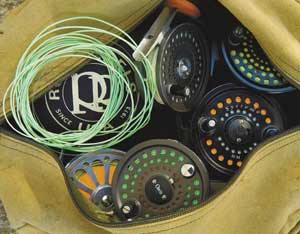
I love cold-weather fly fishing, especially at South Carolina’s mountain rivers and streams. I love the cold air, the challenging fishing conditions, and the lack of crowds. But for many, winter fly fishing is merely a euphemism for hypothermia.
Instead, November is when the fishing gear is stored away until next spring and hunting or football games take center stage. If this describes you, it’s important to realize the importance of gear maintenance before storing your equipment over the next several months.
You don’t want to drag your gear out next spring only to find out your waders have a hole in them, your wading shoes have mildew, and your fly line is dried out and cracked.
Here are a few tips on general gear maintenance that will save you money and have you ready to fish next spring.
Rod Care
Cleaning a fly rod throughout the year is important, but especially before storing for any considerable length of time.
A rod will gather dirt and grime throughout the season, but a mild soap-and-water solution applied with a soft cloth will eliminate dirt build-up.
Make sure to clean the entire rod, including the guide eyelets.
Rinse with water and then wipe down until completely dry. Storing a fly rod in its tube with any moisture will result in mildew.
Also make a quick inspection for any dings or abrasions along the rod or the guides. Replace any guides that are damaged.
Reels
Reel maintenance is simple.
Remove the spool from the reel and submerge the reel in warm, soapy water. Carefully wipe the inner parts with a Q-Tip to remove any built-up dirt and grease.
After letting dry, lube the reel with a good waterproof reel lubricant such as Loon Outdoors Reel Lube.
Apply just enough lube to coat the inner gears and moving parts.
Waders
Waders can take some serious punishment while simply sitting in storage over the winter. Dirt, grit, mildew are all enemies working against the life of this expensive, necessary piece of equipment.
First, your waders need a good cleaning before putting away. Scrub the outside and inside with mild soap and water. Thoroughly rinse with clean water and let dry.
I prefer to hang my waders upside down when not in use. Folding them for long periods of time can create creases and, ultimately, holes.
Wading Shoes
For wading shoes, use the same techniques that were used for waders.
Scrub them down with mild soap and water before rinsing.
If wading shoes have felt soles, be sure to get as much dirt and grit from the felt as possible.
Embedded sand and grit can wear down the felt prematurely.
Check the laces for wear or abrasions and replace if necessary.
A broken lace at the river can make wading unsafe.
Fly Lines
A fly line can provide several seasons of productive fishing if cleaned and maintained properly.
Again, remove the spool from the reel, then submerge the spool, with the fly line on it, into a mixture of warm water and mild soap or detergent.
After a few minutes, remove the spool from the water and pull the line from the spool. Pull the line through a towel or sponge, then run the towel or sponge through the entire length of fly line at least two time. Accumulated dirt on the towel will be evident.
Rinse the soap residue from the line with a hose of by submerging into a bucket of clean water. Run the line through another clean towel or sponge to completely remove any soap.
When the line is dry, apply fly-line dressing to the line. The dressing with protect the line from drying and cracking. This process also will lubricate the line and allow anglers to make farther, more accurate casts.
By following some of these instructions and guidelines, anglers can protect fly-fishing gear during the off-season, lengthen its life expectancy, and be confident that equipment will be ready to go next spring.



Be the first to comment